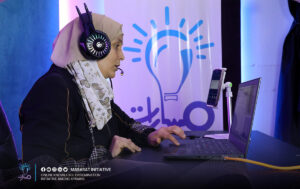Online learning and remote work have emerged as significant factors providing unprecedented opportunities for women to learn, advance their careers, and participate in the workforce in any society. The digital transformation of businesses has led to a wide array of digital jobs, eliminating geographical restrictions and dismantling traditional barriers that prevent women from improving their social and economic status, benefiting the family as a whole with welfare and prosperity.
Increased Access to Global Learning
Online learning platforms have democratized access to education, ensuring that people from all walks of life have access to high-quality educational resources. This has been particularly important for women, who face cultural, societal, or logistical challenges in many parts of the world that make traditional education inaccessible.
Online learning allows women to acquire knowledge, skills, and credentials from reputable and trusted institutions, regardless of location or personal circumstances. Statistics indicate that 45% of females would have had to stop or postpone their studies if online learning had not been an option. This enables them to expand their horizons, pursue academic passions, and gain experience in diverse fields.
Online learning meets the need for women to balance their educational journey with work responsibilities and home care, allowing them to improve or update their skills at their own pace. Despite lower school enrollment rates for females compared to males globally, according to research from the World Economic Forum, females excel over males in the time it takes to develop foundational skills across all competency levels.
Empowering Career Progression with Work-Life Balance
Remote work has emerged as a game-changer in conventional work norms, offering women greater flexibility and control over their professional lives. Females, especially married ones, still face obstacles to career advancement due to the routines in traditional offices that require strict schedules or offer limited opportunities for work-life balance.
Remote work alleviates these constraints, allowing women to excel in their careers while maintaining personal commitments. This shift to remote work has proven particularly beneficial for working mothers by reducing the need for commuting and providing flexible schedules that allow them to care for their children and commit to work simultaneously.
This new balance encourages more women to enter and remain in the workforce, with females applying for remote positions at a higher rate than males. This trend also aligns with the preferences of more than 60% of females who express a desire to work remotely, according to a poll conducted by The Washington Post.
We also witness an increase in productivity, with research from the World Economic Forum indicating a 40% productivity increase among females compared to a 30% increase among males, suggesting that remote work enables them to succeed professionally.
Acquiring Digital Skills and Transitioning to Higher-Paying Jobs
Globalization, automation, and digital transformation create new necessities for reskilling. The emergence of artificial intelligence has accelerated this urgent need for increased remote employment.
The growth and adoption of professional micro-credentials as a powerful tool for empowering women by providing them with the necessary means to quickly acquire digital skills and transition to higher-paying jobs have been highlighted. These also offer a pathway for women to return to the job market after a long hiatus and acquire new skills required to address the changing nature of jobs.
Digital jobs, such as data analysis, programming, or digital marketing, enable everyone to learn the required skills online. Moreover, these jobs can often be performed remotely, creating opportunities for the skills of working females everywhere and granting them access to sought-after roles previously out of reach. The affordability of micro-credentials compared to traditional on-campus degrees makes them accessible to a wide range of women across the social and economic spectrum.
While artificial intelligence has accelerated the need for widespread skills retraining, it will also be an essential part of the solution. AI can create high-quality, low-cost training content, reduce language barriers with machine translation, and enhance the learning experience by making it more personalized and interactive, increasing opportunities for women worldwide to learn, acquire skills, and then enter the job market to secure significant positions with high salaries.
In summary, online learning and remote work lead to a radical transformation, creating more equal opportunities for women in a society that has long suffered from gender disparities. By empowering women with access to high-quality education, achieving work-life balance, and learning job-ready skills, we work towards equal opportunities and empower women to be a strong participant in the economic engine of the 21st century.
In the digital age, it’s crucial to build on these developments, enhance inclusivity, and unleash the full potential of women in the modern workforce. From this perspective, the Masarat Initiative strives to secure an appropriate and diverse educational process, enabling females to access educational materials and secure free online school education, as female participation in our community’s education increases societal awareness and what they will offer to their children in the future.
Author: Fouad Al-Dik, Volunteer at Masarat Initiative







